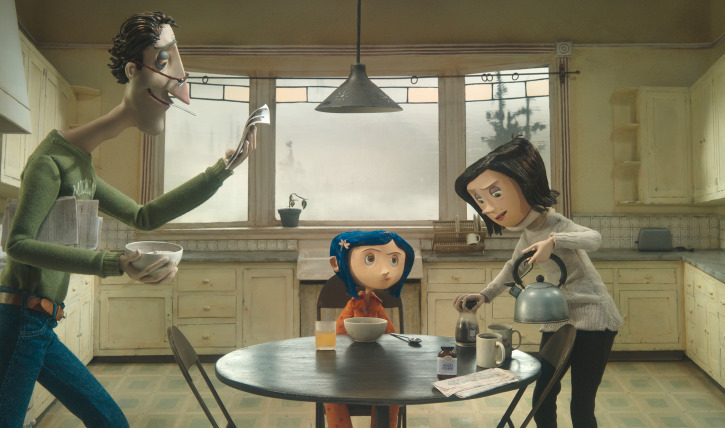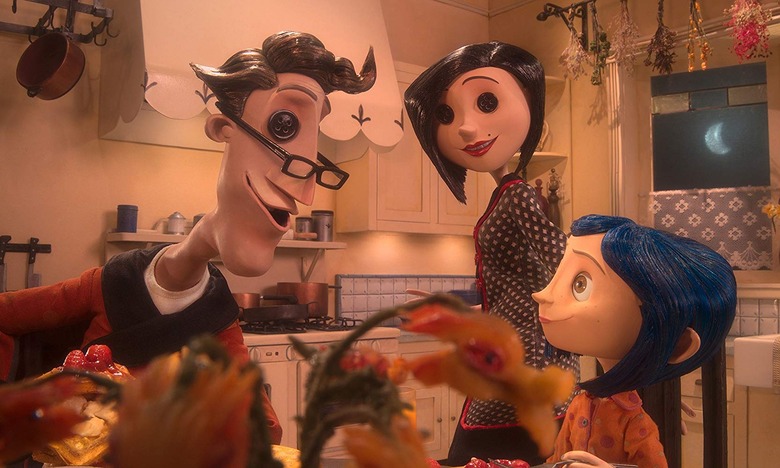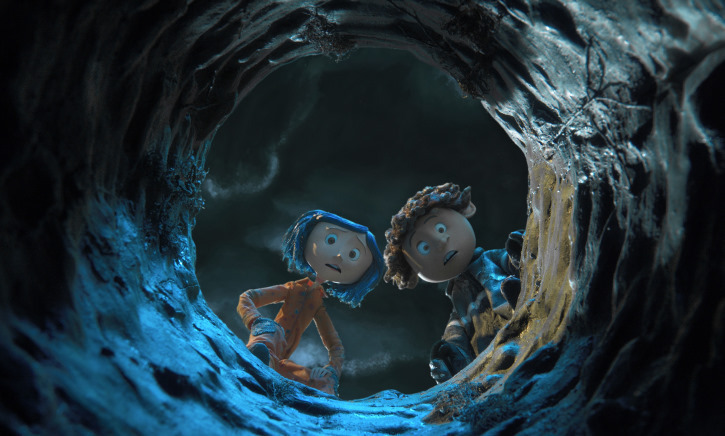'Coraline' Is About The Fear Of Growing Up – And The Realization That It's Not That Bad
(To celebrate the release of Missing Link, we're revisiting the stop-motion animated films of Laika this week and discussing why they're so special. Today: Coraline is an adventure movie where adulthood is the villain.)
At first glance, Coraline seems ripe for the haunting of children's dreams. Henry Selick's 2009 stop-motion feature adaptation of the Neil Gaiman storybook of the same name is creepy, ghastly, and a little disturbing, with elements that could put an adult-targeted horror film to shame.
But the scariest part about Coraline isn't the horrifying implications of the button eyes or the spindly child-eating spider-woman. It's the idea that we're all doomed to become boring, uninteresting adults.
Kids on an Adventure
When Neil Gaiman wrote Coraline in 2002, he was inspired by the tales invented by his daughter Holly when she was still in kindergarten. "She would make me write down her stories, which were always about little girls being kidnapped by evil women, witches normally, who would disguise themselves as her mother," Gaiman told the CBC in 2009. "They were the kind of stories that would have given Edward Gorey nightmares."
From the mouths of babes come the most horrifying images to adults. That of child-kidnapping witches and imposters disguising themselves as loved ones strike a primal chord with adults, who know exactly the stakes those kinds of stories set up. But for children, those aren't the kind of monsters that strike fear in their hearts. In the first half of Coraline, those monsters are the dull, lifeless adults surrounding the titular heroine.
Well, not monsters per se. But for Coraline (voiced in the film by Dakota Fanning), her parents represent the bane of her existence, the fun-averse foils to her desire for something, anything interesting to happen. That is immediately apparent in the drab, gray color palette of the first part of the film, when Coraline and her parents move to a new house in an isolated neighborhood in rainy Portland. Frustrated that her busy writer parents ignore her and surrounded by foolish neighbors, Coraline sinks into a soul-sucking boredom that many children are probably familiar with, but that adults have long forgotten. So when an unusual doll beckons her down an ominous corridor, Coraline doesn't hesitate to explore it.
"Children react to the story fundamentally as an adventure," Neil Gaiman said of Coraline in 2009. "They may get a little bit scared, but it's an 'edge-of-your-seat, what's-gonna-happen-next, oh scary!' thing, because you're giving them a story about somebody like themselves."
From the beginning of Coraline's adventures in the Other World, something is off. But despite the multiple red flags — from doppelgangers (who were the very subject of this year's biggest horror hit!), to the buttons sewed over her Other Parents' eyes, to the mute Wybie, to the cryptic warnings from neighbors — Coraline ignores them to avoid her greater fear of being crushed by ceaseless boredom. Where Alice in Alice in Wonderland goes down the rabbit hole somewhat by accident, Coraline willfully enters and re-enters a world so much brighter and weirder than her own, despite her own misgivings. Before you know it, Coraline has embedded you so deeply in its heroine's perspective that you get swept you up in her technicolored vision of the Other World and all of its amazing sights.
Kids in Danger
But what happens when the story you're watching unfold is not about yourself? Seeing Coraline again for the first time since its release in 2009, I was struck by how much I identified with the tired, frazzled parents. Perpetually exhausted and stressed over their writing deadlines, Coraline's mother and father (Teri Hatcher and John Hogdman, respectively) are adulthood in a nutshell. Their actions, so infuriating to Coraline, make sense — perhaps they're not totally present when it comes to their daughter's needs, but they're doing their best and stepping up when they do sense that something is off. It's an experience that perhaps far too many adults can relate to.
"Adults get scared," Neil Gaiman said. "Adults get disturbed, and I think one reason for that is because it's a story about a child in danger and I think we're hardwired to worry about children in danger."
But to think of Coraline as simply a story of child endangerment would do disservice to the story. One of the major points of conflict in the movie occurs when Coraline is eagerly tries to return to the Other World, only to find the door locked and the key missing, her mother putting it away upon having noticed her bizarre behavior. But so embedded are we in Coraline's perspective that this plays like a betrayal, and even further evidence that her parents, to Coraline, are the villains. But that animosity comes not because Coraline is feeling neglected or that she is feeling ignored. It's because she's not taken seriously.
Coraline's prickly attitude was always a fascinating element of the film — especially in a genre that emphasizes aspirational relatability in their heroines — but it becomes even more apparent upon rewatch. She's borderline hostile with her parents, simply over the fact that they won't entertain her, and the fact that they've uprooted her entire life to live in an isolated house. That feeling of isolation and helplessness in the face of a big life change is something that's been explored in other animated films like Inside Out and Spirited Away, but in Coraline, our protagonist wields those feelings almost like a weapon. She continually clashes with not only her parents but all the adults she encounters, treating everyone with a sense of superiority.
When she ultimately goes up against the real villain of the film, the grotesque spidery figure that lures in and eats unloved children, it's the capture of her parents that spurs Coraline into action. Here, the situation is reversed and Coraline is the one upon whom her parents rely. But for Coraline, and the similarly aged audience of this movie, once she has that power and responsibility, there's no doubt that she will win the fight.
"Yes, they're going up against something dark and nasty," Gaiman said. "But it's like James Bond going up against a James Bond villain. You never have any doubt that James Bond is going to get through it."
Childhood Lost
In a sense, the adults all represent the kind of adult that Coraline doesn't want to be. Her parents, the workaholics who have no time to actually engage in the activity they write so feverishly about. April and Miriam, the washed up burlesque dancers who yearn for their golden days of youth. Sergei Alexander Bobinsky, the trademark neighborhood loony who may or may not have a circus of jumping mice. Rather than fascinating personalities who have lived full, long lives, Coraline only sees dull adults on whom the world has turned its back. It speaks to Coraline's sense of isolation and neglect. Poor try-hard Wybie is maybe the only outlier in terms of Coraline's manifestations of her insecurities.
But upon Coraline's escape from the Other World and her defeat of the Other Mother, her world is suddenly much brighter. Her wacky neighbors and their storied pasts are much more interesting, and her parents warmer and more attentive to her. In the context of the movie, it could be because the evil Other Mother, aka Beldam, has been defeated and her shadow no longer looms over the neighborhood. Or it could mean that Coraline has embraced the idea of growing up.
It's all a matter of perspective.



